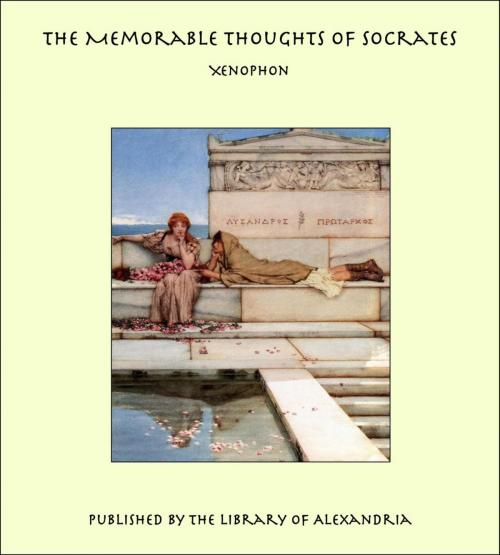The Memorable Thoughts of Socrates
Nonfiction, Religion & Spirituality, New Age, History, Fiction & Literature| Author: | Xenophon | ISBN: | 9781465552051 |
| Publisher: | Library of Alexandria | Publication: | March 8, 2015 |
| Imprint: | Language: | English |
| Author: | Xenophon |
| ISBN: | 9781465552051 |
| Publisher: | Library of Alexandria |
| Publication: | March 8, 2015 |
| Imprint: | |
| Language: | English |
I have often wondered by what arguments those who indicted Socrates could have persuaded the Athenians that his life was justly forfeit to the state. The indictment was to this effect: "Socrates is guilty of crime in refusing to recognise the gods acknowledged by the state, and importing strange divinities of his own; he is further guilty of corrupting the young." M. Schanz, "Plat. Apol. mit deutschen Kemmentar, Einleitung," S. 5 foll. In the first place, what evidence did they produce that Socrates refused to recognise the gods acknowledged by the state? Was it that he did not sacrifice? or that he dispensed with divination? On the contrary, he was often to be seen engaged in sacrifice, at home or at the common altars of the state. Nor was his dependence on divination less manifest. Indeed that saying of his, "A divinity gives me a sign," was on everybody's lips. So much so that, if I am not mistaken, it lay at the root of the imputation that he imported novel divinities; though there was no greater novelty in his case than in that of other believers in oracular help, who commonly rely on omens of all sorts: the flight or cry of birds, the utterances of man, chance meetings, or a victim's entrails. Even according to the popular conception, it is not the mere fowl, it is not the chance individual one meets, who knows what things are profitable for a man, but it is the gods who vouchsafe by such instruments to signify the same. This was also the tenet of Socrates.
I have often wondered by what arguments those who indicted Socrates could have persuaded the Athenians that his life was justly forfeit to the state. The indictment was to this effect: "Socrates is guilty of crime in refusing to recognise the gods acknowledged by the state, and importing strange divinities of his own; he is further guilty of corrupting the young." M. Schanz, "Plat. Apol. mit deutschen Kemmentar, Einleitung," S. 5 foll. In the first place, what evidence did they produce that Socrates refused to recognise the gods acknowledged by the state? Was it that he did not sacrifice? or that he dispensed with divination? On the contrary, he was often to be seen engaged in sacrifice, at home or at the common altars of the state. Nor was his dependence on divination less manifest. Indeed that saying of his, "A divinity gives me a sign," was on everybody's lips. So much so that, if I am not mistaken, it lay at the root of the imputation that he imported novel divinities; though there was no greater novelty in his case than in that of other believers in oracular help, who commonly rely on omens of all sorts: the flight or cry of birds, the utterances of man, chance meetings, or a victim's entrails. Even according to the popular conception, it is not the mere fowl, it is not the chance individual one meets, who knows what things are profitable for a man, but it is the gods who vouchsafe by such instruments to signify the same. This was also the tenet of Socrates.















